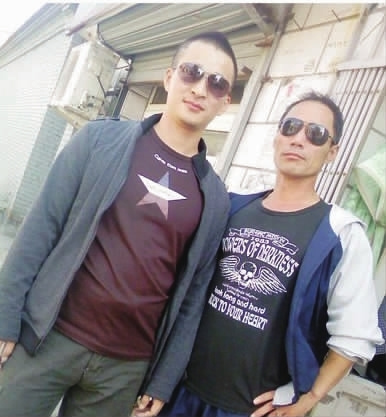Two Chinese farmers who became an overnight sensation when their heart-rending version of a famous pop song appeared on the Internet took to the stage in front of thousands of fans in Shanghai Saturday.
|

Wang Xu (left), 44, and Liu Gang, 29, two Chinese farmers, have become an overnight sensation when their heart-rending version of a famous pop song appeared on the Internet.
|
Wang Xu, 44, and Liu Gang, 29, sang "In the Spring" alongside the song's star composer Wang Feng, in front of about 80,000 people at the Shanghai Stadium.
The audience buzzed with excitement and let out deafening cheers, the moment as they were introduced on the stage and then when Liu started first sentence of their parts of the song.
"It is really exciting and perfect," said Wang Xu, in a telephone interview with Xinhua after the performance. "I was not nervous, but dare not look at the audience, " said Wang Xu, who added he had never dreamed of standing on such a big stage.
The two migrant workers became stars after singing the tearjerker song during an evening drinking session in a 6-square-meter rented room in southwest Beijing's Fengtai District in a late August evening. A friend recorded the performance on a cellphone and posted it on the Internet.
Wang Xu, from the central Henan Province, and Liu, from the northeastern province of Heilongjiang, are among the millions of farmers who have migrated to China's cities to work.
EMOTIONAL APPEAL
In the video, the pair are shirtless and sweating. Liu sits playing the guitar, and Wang Xu stands singing.
"If someday I am dead, please bury me in the spring," they sing. Wang's penetrating chorus, delivered with his eyes closed, has reportedly moved thousands to tears.
Wang and Liu consider the song a true portrait of vulnerable groups like themselves.
"With no credit card, no girlfriend, or a home with hot water, but only a guitar, I am singing happily, on streets, under bridges or in wild country, though nobody pays attention to the music," they sing.
"It is exactly about us," Wang said. "We belong to the underclass, and you know people won't care about us."
The video has racked up tens of millions of hits, especially from people who are also from rural towns or the countryside.
Many people said they cried after watching the video.
A posting by "Zaoyingzi" said the video reminded him of the time when he was in south China's Shenzhen city, where he worked from 7 a.m. to 11 p.m. every day and had one day off each month. "Unable to buy train tickets home, friends gathered to mourn, drink and sing together on the last night of Chinese lunar year."
Zhou Qiang, 50, secretary of Hunan Provincial Committee of the Communist Party of China, said at a meeting that the performance showed the "power" and feelings of the masses.
To support his wife and two sons, Wang came to Beijing in 2000 and has worked as boiler man, and street peddler, before becoming a medical warehouse keeper, with a monthly pay of around 1,500 yuan ( 227 U.S. dollars). Little is left after he pays 600 yuan for rent and buys food.
In September 2003, Wang started busking downtown Beijing's pedestrian underpasses at weekends or evenings.
"I love music, and also want to earn some money to meet my daily needs," Wang told Xinhua.
Liu came to Beijing in 2002, two years after he ended military service. "I wanted to try my luck in the big city," he said.
He had worked as a guard, roadside peddler, and porter, but never had a stable job. Busking was his main income, even after he married and become a father three years ago.
"I can get 30 to 80 yuan normally an evening, and more than 100 at my best," Liu said. "But it may take days to recover if I develop a sore throat after to hours of singing."
He recalls tougher times when he had to sell his aluminum pan for 2 yuan, to buy four mantou, or Chinese steamed buns, to eat.
A BETTER LIFE
Wang and Liu are still uncertain where their fame will lead. Wang has started learning to use a computer. They even have a microblog account to communicate with fans.
"We are happy and proud that so many people think the music video represents heartfelt expression of migrant workers and the underclass," Wang said.
Wang and Liu want to continue singing, but underpasses are now out of the questions as the crowds they draw are too big.
Wang appealed to the public to be more understanding of migrant workers.
"Please don't look down upon migrant workers, who may be less educated, but are kindhearted," Wang said.
The migrant workers built the city's gleaming towers, but they might never be allowed into the buildings, Wang said. "The guards possibly won't let a farmer-looking guy enter the beautiful buildings."
Zhang Yiwu, a professor at Chinese language department of Peking University, said new media and the Internet had provided grassroots groups with a channel to speak out.
Besides the material needs of the vulnerable groups including the migrant workers, "their cultural needs also should come to our attention," Zhang said.
Government figures indicate the number of China's migrant workers stood at 150 million in 2009. They usually take tiring but low-paid jobs due to their lack of education and skills, and send money back to their families in underdeveloped rural areas.
(Xinhua News Agency November 15, 2010)